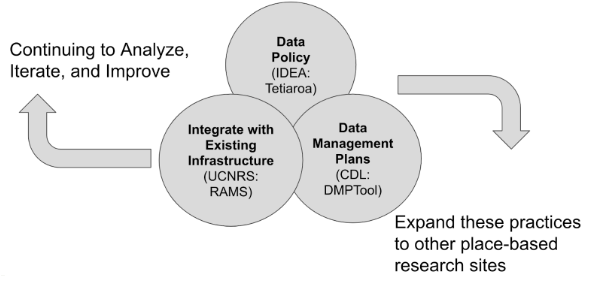About the Project
Our goal is to translate the FAIR and CARE principles into a set of specific requirements and implementable activities that demonstrate how good data management practices and policies accelerate field-based research for the benefit of all stakeholders.
What we are learning
The FAIR Island project examines the impact of implementing optimal research data management policies and requirements, affording us the unique opportunity to look at the outcomes of strong data policies at a working field station. It also offers a real-world example to prove the capabilities of machine-actionable data management plans (maDMPs) and to analyze the downstream effects of these policies in the resulting release of data.
- Develop and iterate on an exemplar place-based data policy. In Year 1, we created and a place-based data policy for Tetiaroa Ecostation. Our next steps are to work with the Tetiaroa Society on adoption. We have created a generalized data policy for other field stations to adapt and adopt. The Project will support adoption by additional sites by the end of this EAGER.
- Adapt, test, and prove the capabilities of networked data management plans (DMPs) for field stations: Networked DMPs integrate and leverage a range of existing tools and platforms. Adapted for place-based research, they are utilized for research projects, with Tetiaroa as the use case, as a key way to track provenance, attribution, compliance, deposit, and publication of all data collected at research sites. The Project will expand the use of networked DMPs to additional field sites.
- Demonstrate the benefits of FAIR data policies and workflows to all stakeholders for the field station. Through the use of persistent identifiers, networked DMPs will lessen the administrative burden on field stations, researchers, and grant administrators. The Project will visualize a PID Graph (Cousijn et al. 2021) specific to Tetiaroa research at the Ecostation to quantify the connectivity of researchers, organizations and research outputs and to show this change over time.
Work Plan
The FAIR Island Project is an iterative project. We focused on Phases 1 -3 in 2020 and 2021. In 2022, we are now in Phase 4 and Phase 5.

Phase 1: Establishing FAIR-compliant Data Policies
A FAIR Island data management policy and corresponding procedures for research data management on the island will be developed with the Scientific Advisory Board (SAB) of the Tetiaroa Society (TS). A draft has been produced by TS Science Director, and is now in review.
Phase 2: Developing Machine-Actionable Data Management Plans
Much of the technical infrastructure of the FAIR Island project builds on existing and ongoing work making DMPs machine-actionable, the core component of CDL’s NSF funded EAGER grant. The DMPTool team recently completed work prototyping the generation of DOIs for DMPs. CDL has also been active in conceptualizing the capabilities of maDMPs as summarized in blog posts covering such topics as ten principles for machine-actionable data management plans, what maDMPs are, what they can do to support automation, utilizing common standards and PIDs, and maDMPs as living documents.
To support the FAIR Island project we will extend our work on machine-actionable DMPs to include:
- identifiers such as ROR, Fundref, re3data repositories
- the completion of an RDA Common Standard compliant API
- support for multiple datasets and multiple contributors
- improved ORCID integration
- moving DOI generation from our testing environment into production
- continuing to ensure all machine-actionable DMP features in the DMPTool application are released in our open DMPRoadmap codebase
Phase 3: Integrating with External Systems
Integration with other systems is a core requirement, and scalable benefit, of the FAIR Island experiment. As an example, we will be working with the UC Natural Reserve System to build upon their reservations management tool (RAMS), which is already in use locally at the field station, to track data from projects and teams spanning scientific domains and institutions. We will also be working on integrations with the Genomic Observatories MetaDatabase (GEOME), the Dryad Digital Repository, and the Merritt digital preservation repository. Additional potential integrations are in discussion and will likely be added to the project’s work plan.
Phase 4: Continuing to Analyze, Iterate, and Improve
Once the policies, procedures, and technical infrastructure are in place we will continue to iterate on our systems to adjust to the realities on the ground. This practical application of the FAIR data principles allows us to experiment with varying workflows in order to identify the optimal system for achieving project goals. Phase Four of the project will focus on analysing the systems as they are used, looking at the downstream effects of adherence to the FAIR Island data policies and procedures, and making any necessary adjustments.
Phase 5: Expanding the FAIR Island Initiative
We’re developing the FAIR Island initiative to create a model research data management environment that can be shared with, and implemented by, other research efforts. Both the FAIR Island team and the administrators of the field station expect this project to inform subsequent work on neighboring islands, likely starting with Moorea, and ultimately extending to other islands in French Polynesia and UCNRS and beyond.
Contact Us
Questions, comments, or advice?
info@fairisland.org
Join the iPlaces Newsletter
Legal Disclaimer
Privacy Policy | Accessibility
Except where otherwise noted, content on this site is licensed under a Creative Commons Attribution 4.0 International license.
